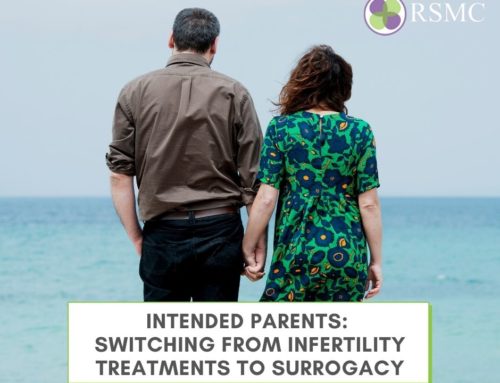After You Become a Surrogate Mother People Aren’t Always Sure How to Help You Recover So You Need to Tell Them What You Need
On many levels a Surrogate’s pregnancy is like any other pregnancy, the reproductive hormone levels are 20-30 times greater than normal. At delivery, hormone levels drop abruptly, along with changes in amino acids, neurotransmitters, and thyroid hormones. This drop in hormones may trigger depression and moodiness in a woman who became a Surrogate Mother, just like it does in any other mother.
Between 75 and 80% of women experience a fairly mild form of depression that’s like an emotional roller coaster, happy one minute and feeling sad or overwhelmed the next. This “baby blues” stage usually peaks at around 7-10 days and last between 2 and 3 weeks total. Roughly 10-20% of women experience full blown postpartum depression. It can come on as a continuation of the “baby blues” where the woman gets worse instead of better. It can also come on later, usually between 4 and 8 weeks after the woman gives birth.
The symptoms are closer to those in a Major Depressive Disorder and can include feeling of anger, guilt, obsessiveness about adequacy as a parent and extreme exhaustion with difficulty sleeping. Unlike the “baby blues” which are gone in a couple of weeks, postpartum depression can last a year or longer. If a woman experiences postpartum depression once, her chances of experiencing postpartum depression with subsequent pregnancies are 10-50%. With that figure in mind, a surrogacy agency might disqualify someone who has experienced postpartum depression if she wants to become a Surrogate Mother.
Most people know what to do after someone comes home with a new baby, they stock the house with food, help with other children, bring the mother treats, handle chores, etc. The majority of this is based on the mother spending most of her time with the new infant. A Surrogate isn’t spending time with an infant but she’s experiencing the same postpartum symptoms. The problem is, most people don’t know how to react or how to help her and may be afraid to say the wrong thing. Often people will stay away until they think the Surrogate is back to her old self because they didn’t know how to deal with the emotions she might be going through.
This is where the Surrogate Mother has to make her wishes known. One suggestion from a California surrogacy agency is to email or call your family and friends after the birth informing them that the baby has been born and that you are home. In the call or email you could mention that you’re still recovering and would love some company during the day, help getting around if you aren’t driving yet, food for your family so you aren’t calling out for pizza constantly, help getting your children to their activities, etc.
These are all things people would think to do automatically if you brought a baby home but aren’t sure about under the circumstances. Once your family and friends understand that you’re recovering from this pregnancy just the way you would from any pregnancy it will make it easier to talk to them. Since you are going to be experiencing some depression it’s good to talk about that too, it’s a hormonal thing and doesn’t change just because you’re a Surrogate.
While you’re recovering from the birth it would be good to have someone to talk to about how you feel, especially the depression. The ideal person would be someone who has been a Surrogate and has been through it already, this is where your surrogacy agency might be able to help by matching you with an experienced Surrogate.
Family members are also good sounding boards because they know how you normally feel and can remind you that this depression will pass. Family is what surrogacy is all about, you went through it to help build a family and your family loves you for it. They want to help you recover, you just have to show them the way.























